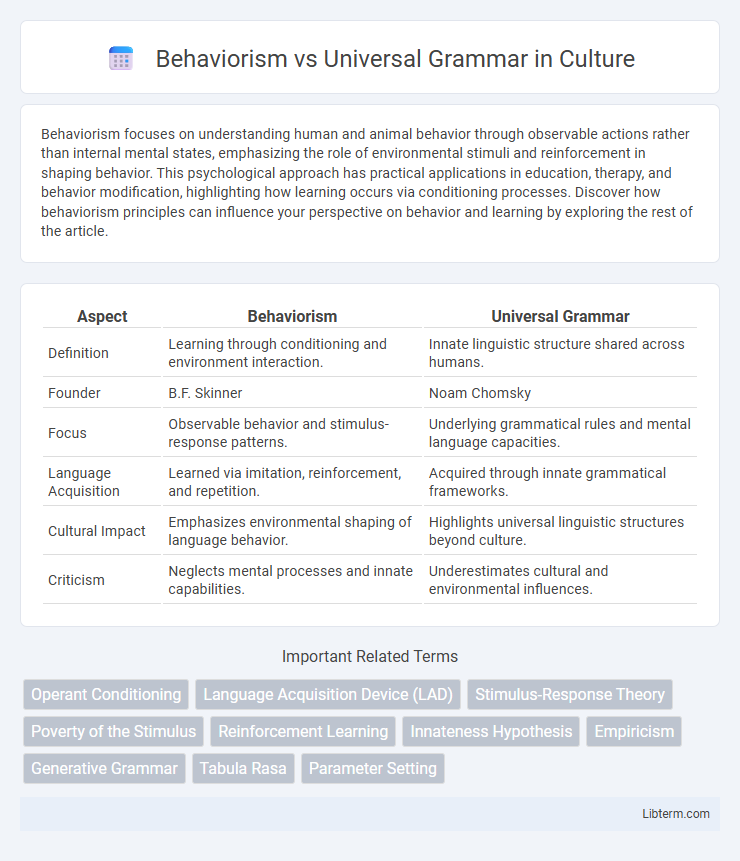Behaviorism focuses on understanding human and animal behavior through observable actions rather than internal mental states, emphasizing the role of environmental stimuli and reinforcement in shaping behavior. This psychological approach has practical applications in education, therapy, and behavior modification, highlighting how learning occurs via conditioning processes. Discover how behaviorism principles can influence your perspective on behavior and learning by exploring the rest of the article.
Table of Comparison
| Aspect | Behaviorism | Universal Grammar |
|---|---|---|
| Definition | Learning through conditioning and environment interaction. | Innate linguistic structure shared across humans. |
| Founder | B.F. Skinner | Noam Chomsky |
| Focus | Observable behavior and stimulus-response patterns. | Underlying grammatical rules and mental language capacities. |
| Language Acquisition | Learned via imitation, reinforcement, and repetition. | Acquired through innate grammatical frameworks. |
| Cultural Impact | Emphasizes environmental shaping of language behavior. | Highlights universal linguistic structures beyond culture. |
| Criticism | Neglects mental processes and innate capabilities. | Underestimates cultural and environmental influences. |
Introduction to Language Acquisition Theories
Behaviorism, pioneered by B.F. Skinner, explains language acquisition through stimulus-response mechanisms and reinforcement, emphasizing environmental influence and learned behaviors. Universal Grammar, introduced by Noam Chomsky, argues for an innate, biological language faculty with inherent grammatical structures prewired in the human brain. These contrasting theories form the foundation of linguistic studies by addressing whether language development is primarily driven by external input or internal cognitive mechanisms.
Defining Behaviorism in Linguistics
Behaviorism in linguistics defines language acquisition as a process driven by stimulus-response mechanisms, emphasizing observable behavior over mental states. It posits that language learning occurs through imitation, reinforcement, and habit formation without innate grammatical knowledge. This approach contrasts sharply with Universal Grammar, which argues for inherent linguistic structures encoded in the human brain.
Understanding Universal Grammar
Universal Grammar (UG) is a linguistic theory proposing that humans are born with an innate set of grammatical principles shared across all languages, enabling rapid language acquisition regardless of environmental differences. This contrasts sharply with Behaviorism, which asserts that language learning results solely from imitation, reinforcement, and conditioning without any inherent grammatical knowledge. Understanding UG involves examining the deep structure commonalities underlying diverse languages, highlighting the biological basis of syntactic knowledge distinct from purely experiential learning models.
Key Proponents: Skinner vs. Chomsky
B.F. Skinner, a key proponent of behaviorism, argued that language acquisition is driven by environmental stimuli, reinforcement, and conditioning, emphasizing observable behavior over innate mechanisms. Noam Chomsky, advocating Universal Grammar, posited that humans possess an inherent, biologically-based linguistic capability enabling rapid and complex language learning independent of explicit instruction. This fundamental debate highlights the contrast between empiricism and nativism in understanding language development and cognitive processes.
Core Principles of Behaviorism
Behaviorism centers on the principle that language learning is a result of stimulus-response associations reinforced through repetition and rewards, emphasizing observable behavior over internal mental processes. This theory posits that linguistic behavior is acquired through conditioning, with no innate knowledge or structures specifically dedicated to language. Key figures such as B.F. Skinner argued that language development is entirely shaped by environmental interaction and reinforcement contingencies.
Fundamental Concepts of Universal Grammar
Universal Grammar (UG) posits an innate set of linguistic principles shared by all humans, enabling language acquisition regardless of environmental variations. It emphasizes deep, abstract syntactic structures that underlie observable speech, contrasting with behaviorism's focus on stimulus-response conditioning and observable behaviors. UG's fundamental concepts include the idea of parameter settings that allow for language variation while maintaining a common grammatical framework across different languages.
Criticisms and Limitations of Behaviorism
Behaviorism faces criticism for its inability to explain the innate aspects of language acquisition emphasized by Universal Grammar, as it primarily focuses on observable stimuli and responses while neglecting internal cognitive processes. It struggles to account for the rapid speed and creativity with which children acquire language, phenomena that Chomsky's theory of Universal Grammar addresses through innate linguistic structures. Moreover, behaviorism's reliance on reinforcement and imitation fails to explain how individuals produce novel sentences they have never heard before, highlighting its limitations in capturing the complexity of human language development.
Challenges to Universal Grammar Theory
Challenges to Universal Grammar theory arise from behaviorist critiques emphasizing language acquisition through environmental stimuli and reinforcement rather than innate linguistic structures. Empirical studies reveal significant cross-linguistic variability and adaptability, questioning the universality of a fixed grammatical framework. Neurocognitive research also highlights the role of general learning mechanisms, undermining the premise of a specialized, hardwired Universal Grammar module.
Comparative Analysis: Behaviorism vs Universal Grammar
Behaviorism emphasizes language learning through stimulus-response associations and reinforcement, while Universal Grammar posits innate grammatical structures common to all humans. Behaviorism accounts for language acquisition via environmental input and conditioning, but struggles to explain the rapid and uniform mastery of complex syntax in children. Universal Grammar offers a biological basis for language acquisition by proposing an inherent set of linguistic principles, facilitating cross-linguistic comparisons and explaining the ease with which children acquire diverse languages.
Implications for Modern Language Education
Behaviorism emphasizes language learning through habit formation and repetitive practice, promoting structured drills and reinforcement in classrooms. Universal Grammar, proposed by Noam Chomsky, highlights innate linguistic structures, encouraging teaching methods that foster natural language acquisition and comprehension. Modern language education increasingly integrates both theories, balancing explicit instruction with immersive, communicative activities to optimize learner outcomes.
Behaviorism Infographic

 libterm.com
libterm.com